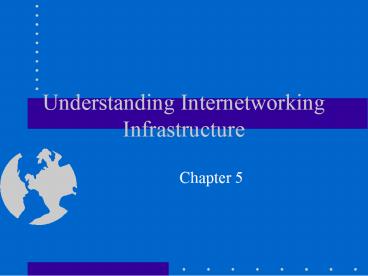Understanding Internetworking Infrastructure - PowerPoint PPT Presentation
1 / 14
Title:
Understanding Internetworking Infrastructure
Description:
Kmart has opened its IS to help suppliers better serve customers. ... Kmart implemented this program in exchange for more frequent ... – PowerPoint PPT presentation
Number of Views:188
Avg rating:3.0/5.0
Title: Understanding Internetworking Infrastructure
1
Understanding Internetworking Infrastructure
- Chapter 5
2
Key questions
- What are the basic components of Internetworking
Infrastructures? - What Business Implications do they bring?
- The Future?
3
Basic Components of Internetworking
Infrastructures
- The Technological Elements
- Local Area networks
- Hubs, switches and Network Adapters
- Wide Area Networks
- Routers
- Firewalls and other security systems and devices
- Caching, content acceleration and other
specialized devices
4
Basic Components of Internetworking
Infrastructures (Cont)
- The Technological Elements of Processing Systems
- Client Devices and Systems
- Server Devices and Systems
- Mainframe Devices and Systems
- Middleware
- Infrastructure Management Systems
- Business Applications
5
Basic Components of Internetworking
Infrastructures (Cont)
- The Technological Elements of Facilities
- Building and Physical spaces
- Network Conduits and connections
- Power
- Environmental controls
- Security
6
Basic Components of Internetworking
Infrastructures (Cont)
- The Operational Characteristics of Internetworks
- Open Standards (TCP/IP)
- Asynchronous Operation
- Inherent Latency
- Decentralization
- Scalability
7
The Rise of Internetworking Business Implications
- The emergence of Real Time Infrastructures
- Broader Exposure to Operational Threats
- New Models Of Service Delivery
- Managing Legacies
8
The Future
- Client-Server model became popular
- LANs, WANs, VANs
- Less dependence on Mainframe computers MIS
- Electronic communication/workgroup computing
tools support group work - See GWUForecast.gwu.edu
9
Organizational Design Challenges
- The Virtual Corporation
- From Control to Learning
- From Autonomy to Collaboration
- Organizational Structure
- Authority and Decision Making
- Operating Processes
- Management Processes
- Incentives and rewards
- Roles/Skills and Expertise
- Career Development
10
Targeted Opportunities
- Communicating Organizational Priorities
- Meaningful Budgets
- Effective Incentive Systems
- Solution for Production
- Adaptation for Change
11
Interorganizational Systems (IOS)
- Networked information systems used by two or more
separate organizations to perform a joint
business function - Interorganizational systems (IOS)
- Electronic Data Interchange uses EDI standards
- Extranets - IOS over the Internet
12
IOS EXAMPLE
Kmart has opened its IS to help suppliers better
serve customers. The interface has an extensive
GUI component and allows 50 to 100 vendors to lo
ok at Kmarts merchandising database.
For example, the system lets Black and Decker ac
cess to any data that Kmart believes helps BD be
tter serve Kmart and its customers. Kmart i
mplemented this program in exchange for more
frequent and smaller deliveries, but also because
it was in the best interested
of the company, its customers and its suppliers.
Why did Kmart implement this IOS? What is the i
mplication for having Kmart decide on what info B
D can access?
13
IOS Risks
- Forces automation lock-in to a particular
system - Government regulations may change
- Great impacts on organizational structures,
systems, people - loss of control - Diminishes organizational boundaries -- requires
trust in partners
14
Electronic Data Interchange (EDI)
- Computer-to-computer exchange of standard
business transaction documents between 2
organizations - purchase orders
- invoices
- bill of lading































